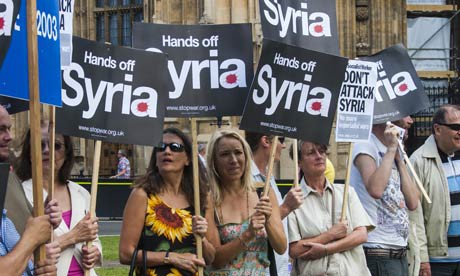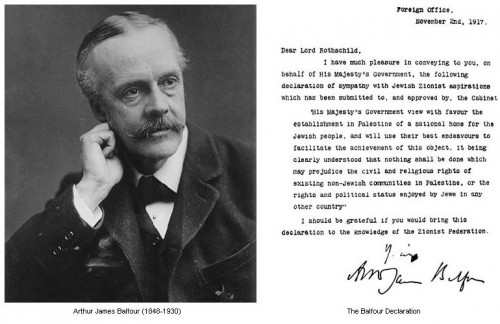
En el centenario de la Declaración Balfour. La responsabilidad histórica de Gran Bretaña en la catástrofe palestina
por Nur Masalha*
Ex: http://paginatransversal.wordpress.com
La Declaración Balfour del 2 de noviembre de 1917 fue fundamental para alianza británico-sionista durante la Primera Guerra Mundial y una poderosa herramienta de propaganda judio-sionista. Al acercarse el centenario de la Declaración es oportuno volver a examinar el impacto tanto de la declaración como de las políticas británicas respecto a Palestina y su población originaria. Este artículo apela al Reino Unido a que reconozca su responsabilidad histórica en las desastrosas consecuencias del colonialismo sionista de asentamiento en Palestina y la subsiguiente catástrofe palestina (Nakba).
Sin el apoyo total de Imperio Británico, el sionismo político no habría podido conseguir sus objetivos a costa de la libertad y la autodeterminación del pueblo palestino. El Estado de Israel era y todavía es fundamental para los proyectos occidentales en Oriente Próximo. De hecho, Israel debe su propia existencia al poder colonial británico en Palestina, a pesar de la tensión militar durante la última década de periodo del Mandato Británico entre la potencia colonial y los dirigentes del militarizado Yishuv, es decir, la comunidad de colonos de asentamiento blancos asquenazíes (1) en Palestina.
Los colonos sionistas europeos eran poco numerosos bajo el Imperio Otomano y nunca se les dio verdaderamente carta blanca en Palestina; si se hubiera dejado al Imperio Otomano el control de Palestina después de la Primera Guerra Mundial, es muy poco probable que el Estado judío se hubiera hecho realidad a expensas de la población indígena. La situación cambió radicalmente con la ocupación de Palestina por parte de los británicos en 1917. Pero antes, el 2 de noviembre de 1917, la Declaración Balfour (cuyas catastróficas consecuencias para el pueblo palestino tienen repercusiones todavía hoy) ya había concedido al sionismo derecho a Palestina. El secretario de Exteriores [británico] Arthur James Balfour envió a la Federación Sionista la carta que contenía la Declaración a través de un prominente judío británico, el barón Walter Rothschild. En ella el gobierno británico declaraba su compromiso con el sionismo: “El gobierno de Su Majestad considera favorablemente el establecimiento en Palestina de un hogar nacional para el pueblo judío y utilizará sus mejores esfuerzos para facilitar la consecución de este objetivo”.
Lo verdaderamente crucial fue que los términos de la Declaración Balfour se incorporaron al Mandato Británico en Palestina en 1922 y fueron aprobados por la Liga de las Naciones. Esto constituyó un espectacular logro político y de propaganda para el movimiento sionista internacional que en aquel momento era un grupo minoritario dentro de los judíos del mundo. Curiosamente, el documento fue criticado duramente por el único miembro judío del gobierno del primer ministro británico Lloyd George: Sir Edwin Montagu, secretario de Estado para India, hizo una clara distinción entre judaísmo y sionismo (una ideología política moderna). Le preocupaba el estatus y la potencial doble lealtad de los judíos británicos y puso en tela de juicio el derecho de la organización sionista a hablar en nombre de todos los judíos.
En 1917 la población judía de Palestina era inferior al 10% del total de su población. El contenido de la Declaración Balfour se arraigaba en la política colonial racista de la denegación. No mencionaba siquiera al pueblo palestino, ya fueran cristianos o musulmanes, que conformaba más del 90% de la población del país. De hecho, el pueblo palestino era propietario de más del 97% de la tierra que Gran Bretaña pretendía regalar. La Declaración se refería a los palestinos cristianos o musulmanes como “las comunidades no judías que existen en Palestina” al tiempo que omitía por completo sus derechos nacionales y políticos. La Declaración es típica del estilo supremacista blanco de la época y encaja con la noción de “una tierra sin pueblo [para un pueblo sin tierra]”, creada para justificar la colonización europea y la negación de los derechos fundamentales de los palestinos.
Envalentonado por la Declaración Balfour, en enero de 1919 el destacado sionista británico Chaim Weizmann acudió a la Conferencia de París y y pidió una Palestina pura “tan judía como Inglaterra es inglesa”. Esto sucedía en un momento en que el principio de “autodeterminación para los pueblos del Imperio Otomano” estaba consagrado en los “Catorce Puntos” del presidente estadounidense Woodrow Wilson. Lloyd George saludó estos principios al tiempo que negaba este reconocimiento internacional del pueblo palestino.
A menudo se explican la alianza británico-sionista y la Declaración Balfour en términos de cálculos de guerra y objetivos estratégicos militares (incluido la proximidad de Palestina al Canal de Suez controlado por Gran Bretaña y la ruta a India). Los historiadores pasan por alto los factores y mitos británicos históricos, ideológicos, de la cultura bíblica protestante y simbólicos. Gran Bretaña y gran parte de Europa habían sido la cuna de las Cruzadas Latinas y de los recuerdos colectivos de la lucha por Jerusalén y Palestina, una amarga “guerra santa” contra el islam que duró varios siglos hasta bien entrado el inicio del periodo moderno y cuya memoria colectiva se revivió en Europa en el momento culminante del imperio en el siglo XIX. Antes de la Declaración Balfour dos imanes, la “Biblia y la espada”, en brillante expresión de Barbara Tuchman (Bible and Sword: England and Palestine from the Bronze Age to Balfour) atrajeron a gran cantidad de cruzados, peregrinos, misioneros, arqueólogos bíblicos, viajeros, cartógrafos, cónsules y miembros del Cuerpo de Ingenieros Reales a Tierra Santa de Palestina. En última instancia esto llevó a la conquista de Jerusalén por parte de Gran Bretaña en diciembre de 1917.
La propia Declaración Balfour estaba calculada para coincidir con el avance del general Edmund Allenby hacia Jerusalén durante la Primera Guerra Mundial. Fue el fruto de unas intensas negociaciones a lo largo de doce meses entre destacados sionistas británicos (el “lobby judío-sionista) y altos cargos del Foreign Office y, en última instancia, del gobierno de guerra de Lloyd George.
El 11 de diciembre de 1917 Allenby entró a pie en Jerusalén y anduvo triunfalmente por la Ciudad Vieja. Era el primer cristiano que conquistaba Jerusalén desde las Cruzadas medievales. Este simbolismo no pasó desapercibido para Allenby o Lloyd George, que describieron la toma de Jerusalén como “un regalo cristiano al pueblo británico”. Allenby fue incluso más explícito: “Ahora han terminado las guerras de los cruzados”, afirmó, dando a entender que su conquista de Palestina por parte de las fuerzas británicas era la “última cruzada”.
El general Allenby nos ha dejado otros símbolos de los antiguos y nuevos cruzados: el “Puente Allenby” (todavía denominado así por los israelíes) que cruza del río Jordán fue construido en 1918 por el propio Allenby sobre los restos de un viejo puente otomano. Actualmente es el único punto de entrada y de salida para los palestinos bajo ocupación israelí que viajen fuera de Cisjordania y a Cisjordania. Tanto Allenby como Balfour son muy apreciados en Israel. Allenby da su nombre a una importante calle de Tel Aviv, “Allenby Street”. Balfouria es una colonia judía al sur de Nazareth fundada en 1922 y fue el tercer moshav (2) que se estableció en la Palestina del Mandato. Toma su nombre del secretario de Exteriores británico que redactó la tristemente célebre Declaración.
En 1917 Weizmann, amigo íntimo del general Jan Smuts, un defensor de la separación racial, primer ministro de Sudáfrica y que se asocia a la redacción del borrador de la Declaración, argumentó: “Una Palestina judía sería una salvaguarda para Inglaterra, en particular con respecto al Canal de Suez”. Sin embargo, tanto Lloyd George como Balfour eran miembros de Iglesias protestantes que compartían la creencia sionista cristiana de que había que “restituir” en Palestina a los judíos del Viejo Testamento antes de la Segunda Venida de Jesús.
La Biblia ha sido el texto clave para redimir el colonialismo de asentamiento europeo. El “primer” texto de Occidente ha sido (y sigue siendo) fundamental para el apoyo occidental al Estado de Israel. La “Biblia y la espada”, las dos herramientas heredadas de las Cruzadas latinas y del colonialismo británico, también han sido fundamentales para la estrategia sionista israelí desde 1948.
Desde finales del siglo XIX el sionismo político (y actualmente el lobby pro-israelí) ha seguido disfrutando de una extraordinaria influencia en las altas esferas de Occidente. Por diferentes razones (entre las que se incluye la epistemología y la política del texto bíblico), el Estado de Israel ha sido fundamental para las políticas de Occidente en el rico en petróleo Oriente Próximo. Además de su valor geopolítico y estratégico, y de sus inmensas capacidades militares y nucleares, el Estado de Israel ha tenido una enorme trascendencia para las políticas occidentales posteriores a la Segunda Guerra Mundial. En el periodo posterior al Holocausto el fuerte apoyo financiero, militar y político concedido al “Estado judío” en Palestina también ha sido considerado una oportunidad de “redimir” a Europa (y a Occidente) por el genocidio nazi.
El sionismo político surgió en Europa a finales del siglo XIX en el momento culminante del imperialismo europeo, directamente influido por el pangermanismo y panjudaísmo. Combinó con éxito los nacionalismos de Europa central y del este con el colonialismo de asentamiento y la Biblia. Los padres fundadores laicos del sionismo judío trataron de sustentar con el texto bíblico la legitimidad de su movimiento colonial de asentamientos.
Desde un principio estuvo claro que el proyecto “restauracionista” solo se podía lograr con el respaldo y el apoyo activo de las potencias europeas. Desde Theodor Herzl a Chaim Weizmann y David Ben-Gurion los dirigentes sionistas eran plenamente conscientes de que no se podía garantizar su programa sin el apoyo de las potencias imperialistas. Herzl escribió claramente acerca de la tierra asiática (no europea) “reclamada” por el sionismo y el establecimiento de un Estado casi europeo de colonos blancos en Palestina: “Si Su Majestad el Sultán [otomano] nos concediera Palestina, a cambio nosotros podríamos emprender la regulación de todas las finanzas de Turquía. Conformaríamos ahí parte de una muralla defensiva para Europa en Asia, un puesto de avanzada de la civilización contra la barbarie”.
Sin embargo, el entonces presidente de la Agencia Judía, Ben-Gurion, declaró al presentar testimonio ante la “Comisión Real de Palestina” encabezada por Lord Peel en 1936: “La Biblia es nuestro mandato”. Para Ben-Gurion la Biblia era el texto matriz del sionismo y el texto fundacional del Estado de Israel. Como Ben-Gurion, Lloyd George y Balfour consideraban la Biblia no solo una fuente histórica de confianza sino también una guía de las políticas cristianas y sionistas en relación con los habitantes indígenas de Palestina. Las militaristas tradiciones y relatos bíblicos de la tierra, reconfiguradas y reinventadas en el siglo pasado como una metanarrativa “fundacional” del sionismo y del Estado de Israel, han sido decisivas en la limpieza étnica de Palestina. Hoy las mismas militaristas tradiciones bíblicas de la tierra siguen estando en el centro del desplazamiento y la desposesión de los palestinos (tanto musulmanes como cristianos) de Jerusalén. Irónicamente, es más probable que, a diferencia de Ben-Gurion, los palestinos modernos sean descendientes de los antiguos israelíes cananeos y filisteos que lo sean los asquenazíes y padres fundadores blancos del Estado de Israel.
El historiador británico Arnold Toynbee calificó una vez a Balfour de “hombre malvado”. Toynbee creía que Balfour y Lloyd George conocían las catastróficas implicaciones que tenían para los palestinos originarios la Declaración Balfour y el hecho de que los británicos fomentaran una comunidad colonial de asentamiento blanca en Palestina.
Por supuesto, ni los cruzados latinos ni la moderna Gran Bretaña tenían derechos de soberanía sobre Palestina. Es indudable que Gran Bretaña no tenía autoridad moral o legal para entregar la tierra que no le pertenecía a un tercero y a un pueblo que no residía en el país. Sin embargo, la Declaración Balfour creó el marco para la lucha sionista por apoderarse de la tierra de Palestina y controlarla, una lucha que ha seguido hasta nuestros días. Por ello la Declaración se convirtió en un elemento fundamental de las exigencias judiciales sionistas e israelíes. Entre 1914 y 1948 la potencia colonial británica en Palestina permitió al movimiento judío establecer en Palestina a cientos de miles de colonos judíos europeos, incluidas varias ciudades, y estableció las bases políticas, militares y de seguridad, económicas, industriales, demográficas, culturales y académicas del Estado de Israel.
Medio siglo después de la Declaración Balfour la primera colonia blanca en Palestina, Kerem Avraham, hoy un barrio de Jerusalén, empezó como una pequeña colonia británica fundada en 1855 por el muy influyente cónsul británico en Jerusalén, James Finn, y su mujer, Elizabeth Anne. Finn combinó un antiguo celo cruzado con un moderno pensamiento “restauracionista” protestante y actividades misioneras con el trabajo oficial de funcionario británico. Él y su mujer eran originariamente miembros de la “Sociedad Londinense para Promover el Cristianismo entre los Judíos”. James Finn también fue un estrecho socio de Anthony Ashley Cooper, séptimo conde de Shaftesbury, un destacado diputado tory, milenarista protestante y colaborador clave del sionismo victoriano cristiano y del evangelismo que preconizaba la vuelta a la Biblia. A Shaftesbury le guiaba el pensamiento victoriano de la “Biblia y la espada”, una combinación de imperialismo victoriano y de profecía mesiánica cristiana. Argumentaba que el “restauracionismo judío en Palestina tendría ventajas políticas y económicas para el Imperio Británico y según la profecía de la Biblia, aceleraría la segunda venida de Jesús. En un artículo publicado en Quarterly Review (enero de 1839), Shaftesbury (inventor del mito “una tierra sin pueblo para un pueblo sin tierra”) escribió: “La tierra y el clima de Palestina están singularmente adaptados para que crezcan productos requeridos por las exigencias del Imperio británico: se puede obtener el algodón más fino en una casi ilimitada abundancia, la seda y la rubia roja (3) son los productos principales del país y el aceite de oliva es ahora, como siempre lo ha sido, la propia grasa del país. Solo se requieren capital y habilidades: la presencia de un oficial británico y la mayor seguridad de la propiedad que su le conferirá presencia, pueden invitar a los de estas islas al cultivo en Palestina; y los judíos, que no se trasladarán a ninguna otra tierra para cultivarla ya que han encontrado en la persona del cónsul británico [James Finn] un mediador entre su pueblo y el Pachá [otomano], probablemente volverán en cantidades aún mayores y se convertirán una vez más en el esposo de Judea y Galilea”.
Con el apoyo del entonces secretario de Exteriores británico Lord Palmerston, Shaftesbury empezó a promover la “restauración” de los judíos en Palestina entre la Inglaterra victoriana de la década de 1830. Shaftesbury también desempeñó un papel decisivo en el establecimiento del consulado británico en Jerusalén en 1839. Las actividades públicas de Shaftesbury, James Finn y sus compañeros “restauracionistas”, que precedieron en casi medio siglo a la fundación del movimiento sionista político europeo por Theodor Herzl, demuestran claramente que el “sionismo” empezó como un claro movimiento de cruzada protestante cristiano y no uno laico judío.
Con todo, lo que llevó al crecimiento del sionismo protojudío laico fueron los estudios del Fondo de Exploración de Palestina (PEF, por sus siglas en inglés) y los mapas de Cuerpo Británico de Ingenieros Reales realizados en la década de 1870. La pacífica cruzada del PEF británico, fundado en 1865 por un grupo de eruditos de la Biblia, geógrafos bíblicos, altos cargos militares y de la inteligencia, y clérigos protestantes, entre los que destacaba el deán de la Abadía de Westminster, Arthur P. Stanley, estaba estrechamente coordinada por la clase dirigente político-militar británica y los servicios de inteligencia ansiosos de penetrar en la Palestina otomana, un país gobernado por el “hombre enfermo de Europa” musulmán (4).
El PEF, que cuenta con oficinas en el centro de Londres, es hoy una organización activa que tiene una publicación académica, Palestine Exploration Quarterly. Por otra parte, el PEF da charlas públicas y financia proyectos de investigación en Cercano Oriente. Según su página web, “entre 1867 y 1870 el capitán Warren llevó a cabo exploraciones en Palestina que conforman la base de nuestro conocimiento de la topografía del Jerusalén antiguo y de la arqueología del Templo del Monte/Haram al-Sherif [sic]”. “Además de estas exploraciones en, bajo y alrededor del Templo del Monte/al-Haram al-Sherif, Warren analizó la Llanura de Philistia y llevó a cabo un muy importante reconocimiento de la parte central del [río] Jordán”. El capitán (después general Sir) Charles Warren, de los Ingenieros Reales y uno de los altos cargos clave del PEF ordenó trazar el mapa de la “topografía bíblica” de Jerusalén e investigar “el emplazamiento del templo”, y observó: “El cónsul [británico] del rey [James Finn] es la autoridad máxima, no de los nativos de la ciudad, sino de los extranjeros. No obstante, en su mayor parte estos extranjeros son los dueños legítimos y los nativos en su mayor parte son los usurpadores”. Al parecer Warren y Finn “cavaron literalmente” bajo los santuarios musulmanes de Jerusalén para trazar el mapa de las “dimensiones originales” del “Templo del Monte”. La arqueología bíblica, los mapas y los estudios de topografía y toponimia llevados a cabo por Warren y los Ingenieros Reales han seguido constituyendo los datos básicos de muchos arqueólogos, geógrafos y planificadores estratégicos oficiales israelíes actuales en su campaña por judaizar la Ciudad Vieja de Jerusalén.
Cuando los colonos judíos blancos se trasladaron a Palestina su actitud respecto a la población originaria fue la típica actitud colonial respecto a pueblos “inferiores” y “no civilizados”, aunque las colonias sionistas siguieron siendo muy pequeñas hasta que los británicos ocuparon Palestina en 1917. Después de la ocupación el proceso se aceleró rápidamente bajo la protección de la potencia colonial. Durante este periodo los sionistas insistieron en que se denominara oficialmente a Palestina la “Tierra bíblica de Israel”. Las autoridades del Mandato Británico concedieron el uso del acrónimo hebreo para “Eretz Yisrael” (la “Tierra de Israel”) tras el nombre de Palestina en todos los documentos oficiales, moneda, sellos, etc.
Durante este periodo (1918-1948) los colonos blancos asquenazíes no hicieron esfuerzo alguno por integrar sus luchas en las de los palestinos que luchaban contra el colonialismo británico. Por el contrario, los colonos actuaron desde la convicción de que la población originaria tendría que ser sometida o expulsada, con la ayuda de los británicos.
Para la década de 1930 la Declaración Balfour se asociaba estrechamente en el pensamiento sionista oficial a la colonización práctica de Palestina y a la limpieza étnica de los palestinos originarios. Desde principios de la década de 1930 en adelante los “comités de traslado” (un eufemismo de “comités de limpieza étnica”) y altos cargos del Yishuv elaboraron una serie de planes específicos que implicaban en general a Trasnjordania, Siria e Iraq. En 1930, sobre el fondo de los disturbios de 1929 en Palestina, Weizmann, entonces presidente tanto de la Organización Sionista Mundial como de la Ejecutiva de la Agencia Judía, empezó a promover activamente en discusiones privadas con altos cargos y ministros británicos la idea del “traslado” de árabes. Planteó al secretario colonial, Lord Passfield, una propuesta oficial aunque secreta de traslado de campesinos palestinos a Transjordania, para lo cual se obtendría un préstamo de un millón de libras palestinas de fuentes financieras judías para la operación de reasentamiento. Lord Passfield rechazó la propuesta. Sin embargo, la justificación que Weizmann había utilizado para defender su propuesta fue la base de los posteriores argumentos sionistas de traslado de población. Weizmann afirmaba que no había nada de inmoral en la limpieza étnica de la tierra, que la expulsión de poblaciones ortodoxas griegas y musulmanas (“turcas”), “intercambios de población”, a principios de la década de 1920 eran un precedente de una medida similar en relación con los palestinos.
Si la Declaración Balfour se convirtió en un elemento fundamental de la memoria colectiva, los mitos y la propaganda sionistas, la Declaración, conocida como “Wa’ad Balfour” o la “Promesa Balfour” en árabe, se convirtió en un elemento fundamental de la memoria colectiva palestina de resistencia. Durante toda la época del Mandato el aniversario de la Declaración (2 de noviembre) se conmemoró de manera generalizada por medio de protestas y huelgas nacionalistas. Los palestinos movilizaron el recuerdo del engaño y la traición británicos como una herramienta de resistencia pacífica a las políticas británica y sionista en Palestina.
La colonización blanca de asentamiento de Palestina culminó con el establecimiento del Estado de Israel en 1948 y la Nakba palestina, la catástrofe de la limpieza étnica y la destrucción de gran parte de la Palestina histórica. La guerra psicológica y la presión militar sionistas expulsaron, en muchos casos a punta de pistola, a aproximadamente el 90% de los palestinos del territorio ocupado por los israelíes en 1948, a menudo bajo la atenta mirada de los británicos que continuaron a cargo del país hasta mediados de 1948. La guerra simplemente proporcionó la oportunidad y el contexto necesarios para purgar la tierra y crear un Estado judío en gran parte libre de árabes. Concentró las mentes judío-sionistas y proporcionó tanto la seguridad como las explicaciones y justificaciones militares y estratégicas para purgar el Estado y desposeer al pueblo palestino. Actualmente, aproximadamente dos terceras partes de los palestinos son refugiados, millones de ellos viven en campos de refugiados miserables en Oriente Próximo y otros millones están repartidos por todo el mundo.
El sionismo militarista e Israel han utilizado la Biblia no solo como una herramienta para la limpieza étnica de Palestina y el “exilio” de millones de palestinos de su patria ancestral, sino también como una manera de borrar la historia palestina y de suprimir la memoria palestina. Actualmente la Nakba palestina está más o menos ausente de la memoria colectiva tanto británica como occidental.
Por otra parte, los palestinos no solo continúan sometidos a la actual limpieza étnica y a las políticas de cruzada en Jerusalén en pleno siglo XXI, sino que durante las seis últimas décadas los israelíes y el lobby proisraelí han desafiado y silenciado los intentos por parte de los palestinos de constituir un relato coherente de su propio pasado. Todavía hoy la Catástrofe de 1948 se excluye del discurso oficial en Gran Bretaña mientras que Israel goza de un apoyo extraordinario en el gobierno británico y la mayoría de los diputados conservadores son miembros de “Amigos Conservadores de Israel”.
La clase dirigente británica elige públicamente una “posición neutral” sobre Palestina que a menudo adopta la forma de silencio o de amnesia colectiva. Dada la responsabilidad histórica de Gran Bretaña en la catástrofe palestina, no puede existir esta neutralidad o indiferencia hacia la injusticia cometida en Palestina.
Se ha creado el proyecto Balfour Project para conmemorar el centenario de la Declaración Balfour y el simbolismo de la alianza británico-sionista y el catastrófico impacto sobre los palestinos. Este proyecto busca: a) honestidad en el debate público y un reconocimiento de las desastrosas consecuencias de las acciones británicas en la época de la Declaración Balfour y a lo largo de todo el Mandato Británico en Palestina, y particularmente el engaño respecto a las verdaderas intenciones británicas; b) disculpas por la mala actuación británica; c) disculpas oficiales británicas a los palestinos por haber ignorado intencionadamente sus legítimas aspiraciones políticas; y d) integridad en el futuro cuando Gran Bretaña aborde la cuestión palestina.
* El Prof. Nur Masalha es Director de Programa del Máster en Religión, Política y Resolución de Conflictos. Formó parte de un equipo de postgrado del Arts and Humanities Research Council (AHRC) y fue miembro del AHRC Peer Review College. Ha sido director el Proyecto de Investigación de Tierra Santa desde 2001 y del Centro para la Religión y la Historia desde 2007. El profesor Masalha también edita Holy Land Studies: A Multidisciplinary Journal (publicado por Edinburgh University Press).
Sus libros más recientes son: The Bible and Zionism: Invented Tradition, Archaeology and Post-Colonialism in Israel-Palestine (2007), La Biblia leída con los ojos de los Cananeos (Editorial Canaán, 2011) y The Palestine Makba: Decolonising History, Narrating the Subaltern, Reclaiming Memory (2012). Próximamente publicará The Politics of Reading the Bible in Israel (2013).
(Traducido del inglés para Rebelión por Beatriz Morales Bastos)
Notas de la traductora:
(1) Los judíos asquenazíes son los judíos oriundos de Europa central y del este.
(2) Moshav es una comunidad rural judío de carácter cooperativo
(3) La llamada rubia roja es una planta cuya raíz se utilizaba para fabricar tintes de color rojo destinados a la industria textil y a la farmacología.
(4) La expresión “hombre enfermo de Europa” se ha aplicado a lo largo de la historia a diferentes países europeos en referencia a la debilidad o decadencia de una economía aparentemente normal.
Fuente: Global Research





 del.icio.us
del.icio.us
 Digg
Digg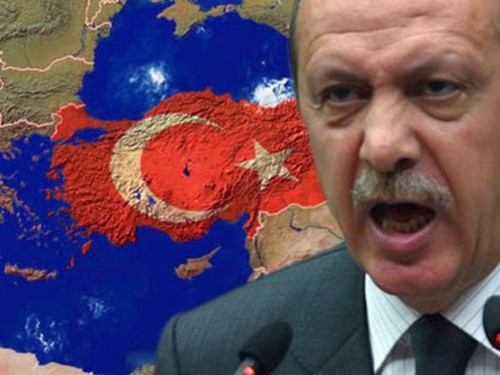
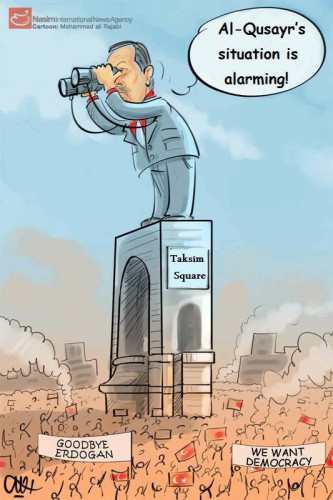
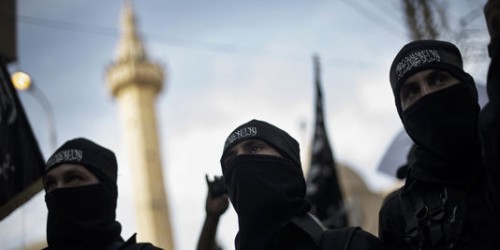
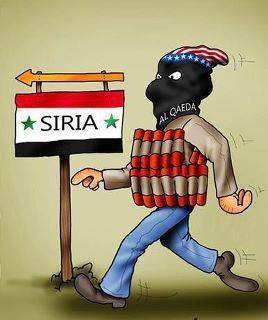 Selon des sources diplomatiques européennes à Beyrouth, le nombre de ressortissants des pays européens se battant en Syrie serait beaucoup plus important qu'annoncé. Il y aurait près d'un millier de Français intégrés dans les rangs des groupes les plus extrémistes de la rébellion, notamment l'Etat islamique en Irak et au Levant (EIIL, proche d'Al-Qaïda), dont les effectifs seraient à 80% composés de non Syriens. Il y a aussi le Front al-Nosra, également proche d'Al-Qaïda et Ahrar al-Cham, représentant la mouvance dite « salafiste-jihadiste ».
Selon des sources diplomatiques européennes à Beyrouth, le nombre de ressortissants des pays européens se battant en Syrie serait beaucoup plus important qu'annoncé. Il y aurait près d'un millier de Français intégrés dans les rangs des groupes les plus extrémistes de la rébellion, notamment l'Etat islamique en Irak et au Levant (EIIL, proche d'Al-Qaïda), dont les effectifs seraient à 80% composés de non Syriens. Il y a aussi le Front al-Nosra, également proche d'Al-Qaïda et Ahrar al-Cham, représentant la mouvance dite « salafiste-jihadiste ».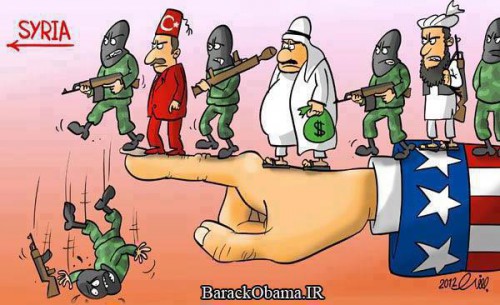
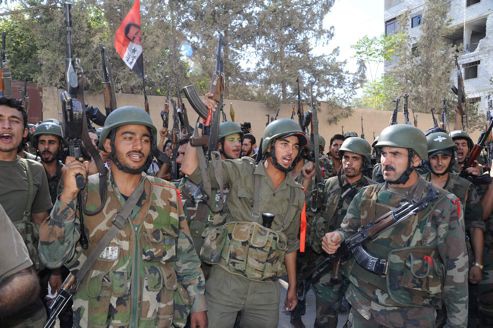
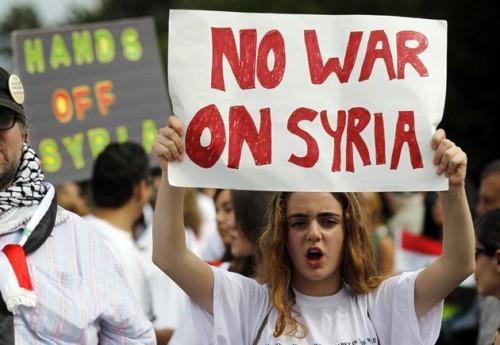

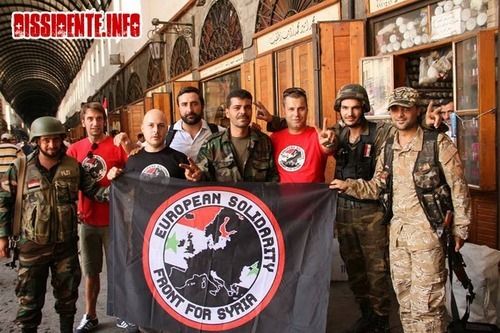
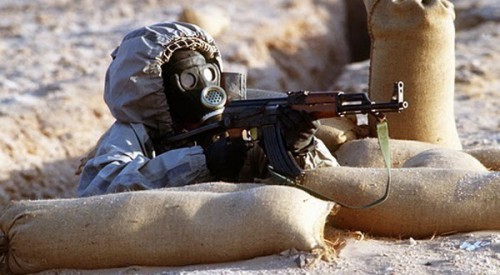

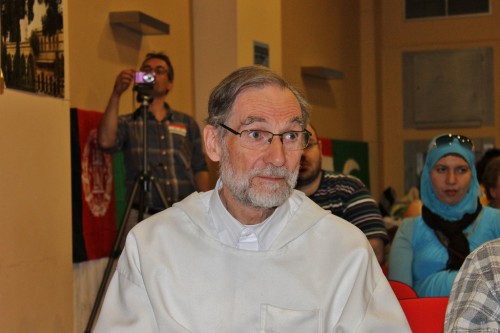
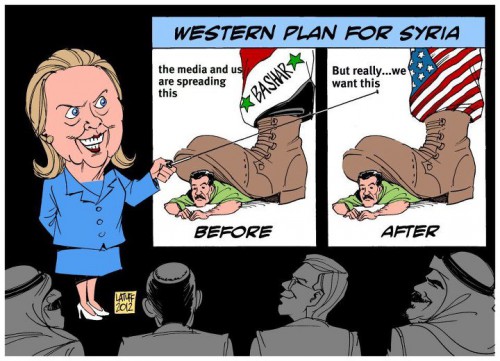

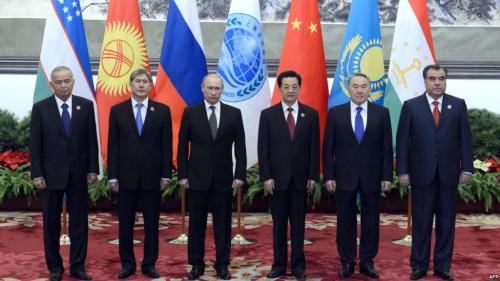

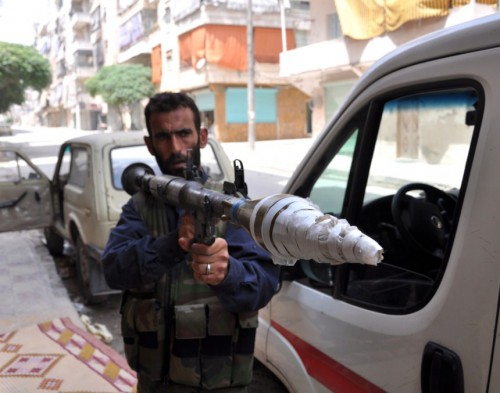
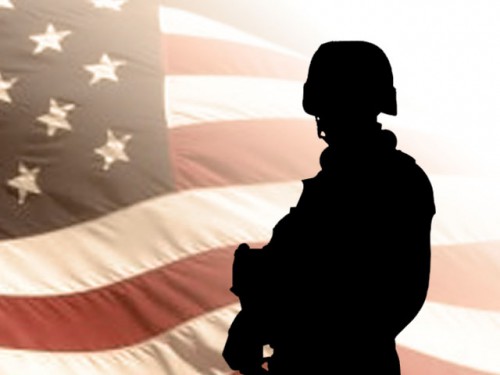
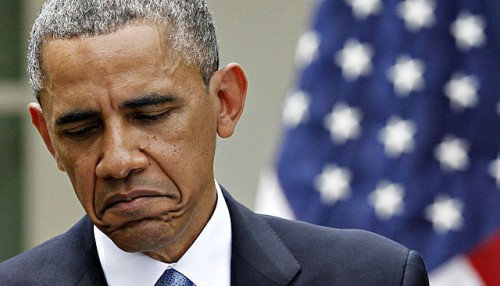
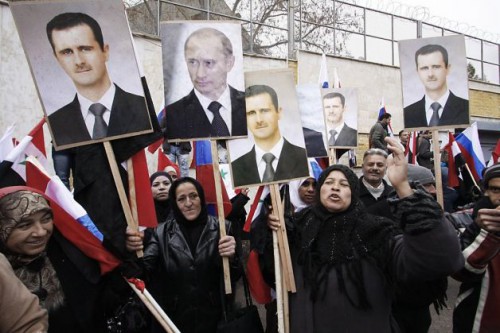
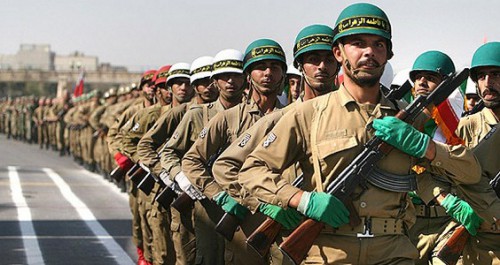
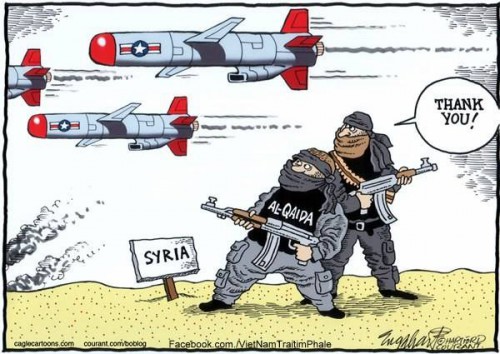
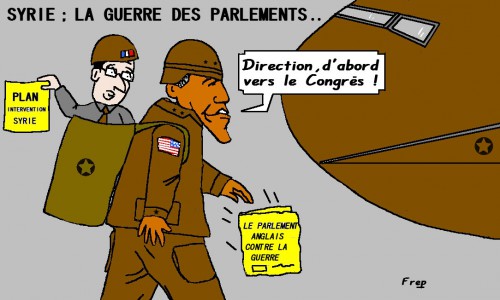
 La politique du gouvernement actuel de la France à l’égard de la Syrie est le prototype même de la confusion, de l’imprudence et d’une absence totale de bon sens.
La politique du gouvernement actuel de la France à l’égard de la Syrie est le prototype même de la confusion, de l’imprudence et d’une absence totale de bon sens.